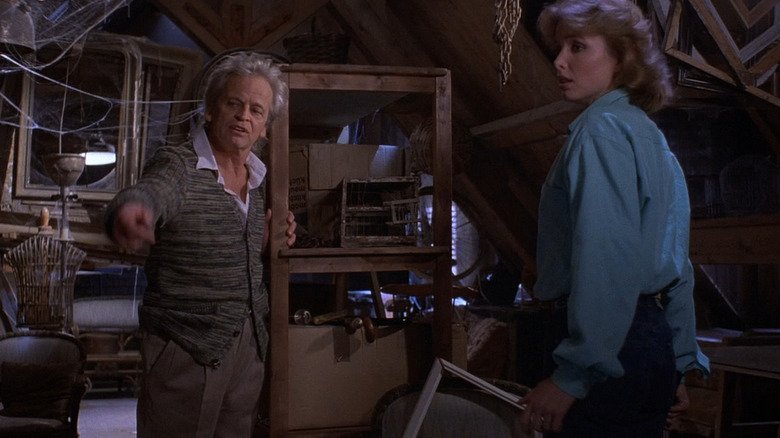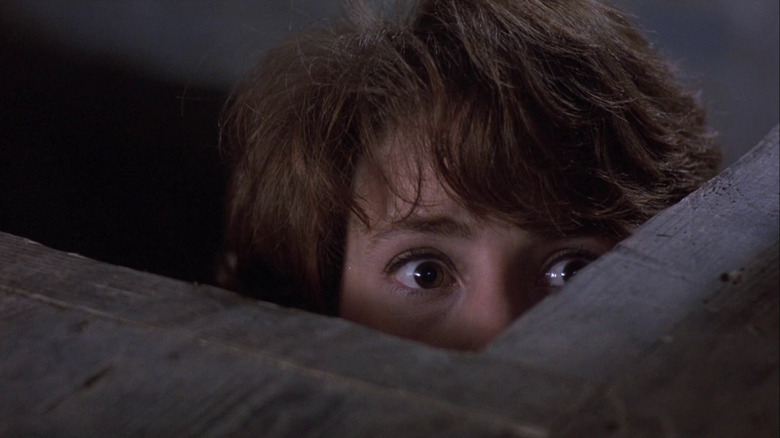How Klaus Kinski Created A Real Nightmare On The Set Of Crawlspace
Klaus Kinski was a monster to work with. Anyone who knows the actor knows he was prone to tantrums and mania on set, allegedly (according to frequent collaborator Werner Herzog) walking off the sets of 35 films in five years. Herzog hated Kinski, but he also thrived on his rage, and the two men made some amazing films together.
Despite his notorious difficulty, and his constant, constant complaints that he was never treated with respect nor was being paid enough, Kinski became an enormous movie star and was hotly in demand by any studio who could secure his talents. He worked constantly, having acted in an average of five films every year from 1962 through 1975. Seekers of intense Euroshlock know Kinski's face and antics, and viewers can rest assured that seeing Kinski's name in the opening credits will mean an unhinged performance — and a bevy of behind-the-scenes stories of Kinski's horrendous behavior.
In 1986, Kinksi acted in David Schmoeller's horror film "Crawlspace." Schmoeller had previously made the cult classic "Tourist Trap" and would go on to make "Puppet Master" and "Netherworld" for the ever-prolific Full Moon Features. "Crawlspace" stars Kinski as the son of a Nazi torturer who has taken up his father's old profession as a hobby. In multiple scenes Kinski dresses in an old Nazi uniform and calls himself God, declaring that he can execute whoever he wants. This is off-the-rack serial killer lore from B-movies, intensified by Kinski's bent vehemence.
It may come as no surprise that Kinski was a nightmare on set and, according to Schmoeller, was nearly killed by a producer of "Crawlspace." Yes, seriously.
Please Kill Mr. Kinski
In 1999, David Schmoeller made a notorious short documentary called "Please Kill Mr. Kinski," in which he recounts — in a gentle, fireside chat sort of way — working on "Crawlspace" with a man as terrible as Klaus Kinski. Schmoeller knew Kinski hated directors and excoriated their very existence, and he was prepared for some tantrums or anger on set ... but not to the level he received. After only a few days of shooting, Schmoeller knew it was going to be bad.
Schmoeller called the producer and explained that Kinski was only going to inspire headaches, and that he had to be fired. The producer relayed Schmoeller's message to the distribution company (Empire Pictures, a Charles Band enterprise) who, to Schmoeller's chagrin, insisted Kinski stay. He was too big a star to dispose of. Schmoeller had resigned himself to working with Kinski, srteeling himself for what he called "a runaway production." Soon, however, a man Schmoeller only refers to as "the Italian producer" (who could only be Roberto Bessi) approached him with a solution: Have Kinski killed and collect the insurance money.
Schmoeller thought Kinski was a horrible person, but he was certainly not going to go ahead with murder.
Over the course of the shoot, however, Schmoeller would be encouraged to take "the Italian producer" up on his offer. Kinski was worse than anyone could have imagined.
Please?
Klaus Kinski, for instance, wailed one day when David Schmoeller said "Action!" to start a scene. Kinski, evidently, was tired of hearing the word. Schmoeller, gathering up his willpower, diplomatically suggested instead of "Action!" he gently say "Klaus." This worked for that day — until Kinski also decided that he was sick of directors calling him Klaus.
Then, a few days later, Kinski wailed and also didn't want Schmoeller to use the word "Cut!" at the end of a scene. He was not permitted to say "Action!," "Cut!," or the star's first name. "Say nothing," Kinski ordered. "I'll stop when I'm finished." It's worth noting here that Kinski only directed one film of his own.
As production went on, and Kinski's horrid antics became less and less tolerable, members of the "Crawlspace" crew — clearly made savvy to The Italian Producer's suggestion — kept approaching Schmoeller. Please, they would plea, kill Mr. Kinski. Schmoeller was, of course, not going to do it, even with Kinski making things more and more horrible. The crew, however, really wanted it done. Please kill Mr. Kinski. There can't be too many film shoots wherein the entire crew is constantly asking the director, in earnestness, to have the leading man assassinated.
Despite the offers and pleas, Kinski was not killed on the set of "Crawlspace."
When Kinski died of a heart attack in 1991, Schmoeller found that he was quoted in numerous obituaries as to how difficult and awful the actor was. Schmoeller felt terrible; shouldn't an obit be a list of accomplishments and celebrations?
Until he remembered how horrible he was.
And, at the end of the day, wasn't Kinski an interesting actor to watch?

